The End of Intellectual Property: On Imagination, Artificial Intelligence, and Procedural Generation
Intellectual Property (IP) is a modern concept
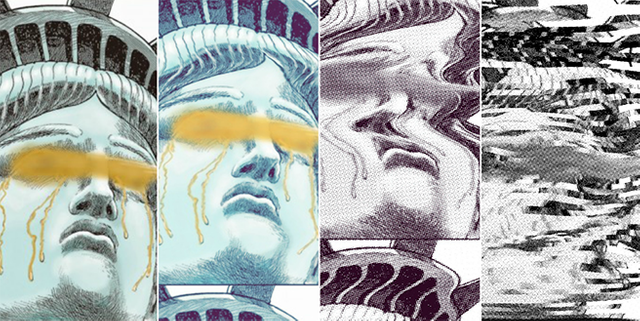
It's a belief that everything that can be digitized, may be claimed by a rightful owner. It is motivated by a desire to counteract theft. Understandably, the sole purpose for such a belief is to secure virtual property. It could be anything from a video, image, textlog, etc. By securing it, the believer wants to:-
- Avoid the tainting or corrupting of valuable information, all to protect against future market devaluation. Sometimes, also to protect sanctity.
- Punish a party that attempted to make a profit off valuable information.
- Shield valuable information against potential intruders / violators.
Also, note that everything can be digitized if the intended manifestation can be measured and recorded. By that logic, intellectual property boils down to a collection of 1s and 0s. Intellectual property is a piece of thought, manifested, and can be translated digitally.
Real question: Is IP all that important?
Like everything else, it depends on your position:-
- The only real advantage of IP is to secure pride or progress / livelihood of the owner.
- The biggest disadvantage of IP is if one's on the wrong side of the law!
- Many more disadvantages, as it leaves one open to the act of criminalization. Check out my post about the problems of criminalization.
The reason why I'm writing this is to show you that intellectual property is on its way to becoming an obsolete, useless concept. There are conundrums and hard truths when it comes to IP.
There's a quiet futility about that concept. Let's explore.
Imitating imagination.
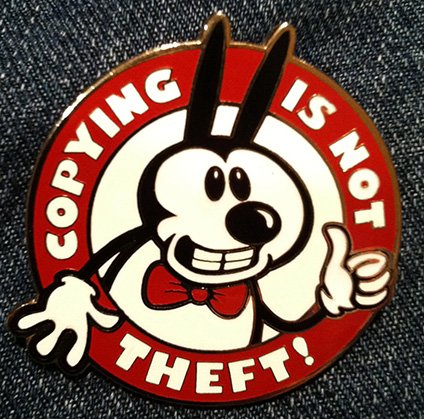
Is it wrong, bad, or evil to copy without consent? Is it theft, especially if the copier makes a profit out of doing so? Yes, if you believe in IP, which also necessarily means that you believe in thought-policing (to an extent). There are several ways to breach IP, and there are different copying methods. Ultimately, copying means imitating the imaginations of an originator.
However, these days it's better to say that copying means imitating information that has a rightful owner, who in turn, owns the imaginings of the originator.
The originator problem in IP.
Everything starts as a thought, before manifesting into reality. Same goes for every music, movie, and script out there. This is clear, but it gets muddier once we attempt to ascertain the point(s) of origin. Here are some conundrums about the origin of information:-
Fidelity of information -

What counts as IP? Must it be 100% identical in its intended manifestation? For example, is it alright to just apply an image filter on protected images and then make a profit out of it? This is a hard problem for lawmakers. There was a local news a few years ago, about some restaurant owner who modified the styling of the KFC brand. The owner ended up paying fines.
The problem doesn't just end with images. The same goes with any other types of information out there. Every information can be manipulated, corrupted to varying degrees. Plus, consider this - your painting would have been different if you do it tomorrow, not today. There are too many parameters that may change the product. Tomorrow you may be rushed for a lunch date, which causes you to mix the red and blue too much, at that point in time.
In any case, IP laws offer protection, but it only works when there's enough capital or currency to do so. The requirements of information fidelity are usually nebulous, and can be exploited to win a case.
Lack of definition -
IP doesn't mean much if it cannot be digitized and filed to the arbiter of truth. However, it would seem mind-boggling to be able to apply IP on a painting of let's say, a bicycle. Sure, one may attempt to apply IP rights on the painting, protecting it from theft by duplication (or perversion). But what if another person manages to copy the entire painting and file it "officially" before the originator?
And anyway, where's the real originator? To add to the problem, similar copies may exist physically, only verifiable through carbon dating and such. And what if its digitized, and to make matters worse, what if the data is located in fragments, distributed across a network?
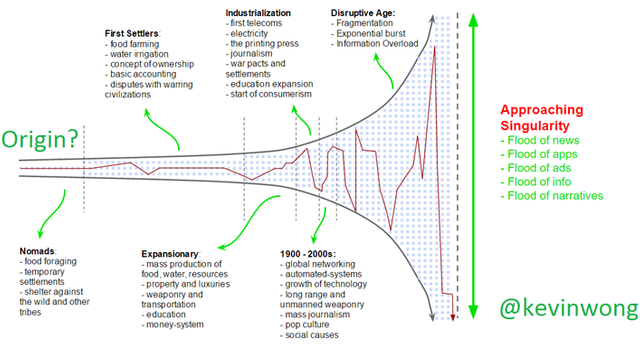
If we are all humans trapped in the confines of rooms, devoid of information, it would be fair to say that creative works (and the world at large) would not have progressed at all. Not much. This is quite like death of the imagination.
I believe that every thought is inspired. There's no real originator, only a chain of modified, intertwined states / data / observation / inspiration / convenient originator - whatever you want to call it.
Deniers of this conundrum are believers of zero-knowledge, stroke of genius. Without proof of work on so many aspects, other than the process of materializing thoughts, it really is difficult to define origination. Add this in to the mix: what if profit is derived from donation or sharing?
Artificial intelligence -
This is a unique, coming-of-age conundrum. With AIs on the rise, is it possible to assign their works as intellectual property? And who owns that virtual property? The computer, the piece of code, the programmer, or the programmer's parents? Most state laws would only define the programmer as the originator. But who knows? Court cases can get really bizarre.
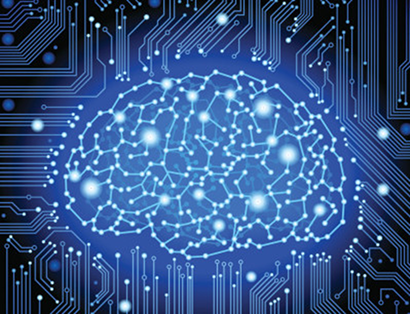
I think the lines will be blurred to the extremes as AI advances, on its way to surpassing human intelligence. With AIs in mind, let's get to the next section. It will be the ultimatum, the last pillar standing for IP.
Procedural generation versus intellectual property

PG means procedural generation. Here's Wikipedia's definition:-
In computing, procedural generation is a method of creating data algorithmically as opposed to manually. In computer graphics, it is also called random generation and is commonly used to create textures and 3D models. In video games it is used to automatically create large amounts of content in a game. Advantages of procedural generation include smaller file sizes, larger amounts of content, and randomness for less predictable gameplay.
This applies to procedural art, music, writing, etc. Every type of information can be generated procedurally. One example is the common fractal. Just supply a seed, and a set of rules, and you're good to go!
Remember that all information are essentially the same. Everything can be abstracted into data, and be represented in consistent ways. Just like the nature of the files in your computer - they can be manifested into mere bits of 1s and 0s, regardless of file-type. With this in mind, lets consider the following conundrums:-
Patterns and irregularities in PG -
In reality, procedural generation produces plenty of gibberish. However, well-thought out procedural algorithms may produce good results, depending on purpose. For example, if you've played games like Daggerfall, Minecraft, Diablo, and other dungeon crawlers - the maps are most likely generated, and made to be different in every new instance.
The most recent ambitious attempt is in a game called No Man's Sky, with its "infinite" procedurally generated universe. The universe in the game is a preset, based on a seed number, but the entire state of the universe is procedurally generated, all to make up for variety. Here's the awesome part, the game is less than 6 Gigabytes in size, and that includes texture files and audio!
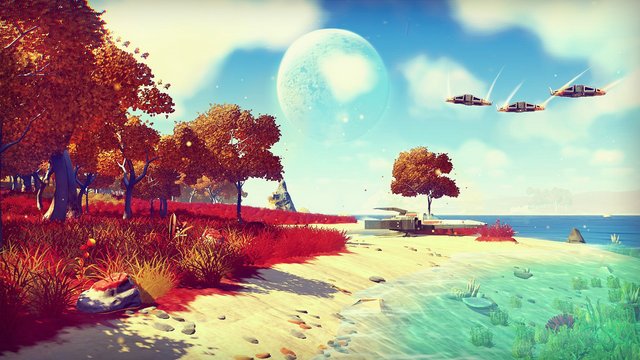
Soon I'd imagine there to be a community / marketplace for PG algorithms. Procedurally generate buildings, chairs, rocks, flowers, animals, ecosystems, aircrafts, stories, textures, characters, colour-palettes and everything else!
PG doesn't require plenty of information. It's basically a set of algorithms, powered by mathematical formulas to generate patterns in chaotic fashion. Patterns may change dramatically, depending on the seed / seed number / seed of life / originator. Another set of parameters are the logical rules. All these amounts to relatively tiny amounts of data storage. Simple sets of information can turn into great complexities.
Here's a graphical experimentation showing off the structure of chaos in the orderly world of logic. If everything is governed by logic in the realm of physical interactions, why do things look messy in nature? This is the answer, and this basic understanding will be the engine of content generation in the future. It will eclipse intellectual property. It allows for cooking up massive amounts of content without the actual need for manual handcrafting. The program that generated this image only follows 8 simple instructions, stemming from a single seed, a black cell at the top of the pyramid. You may think that a follow-through of simple logic will only generate a regular image, but take a look at the irregularities after the program has been looped a few hundred times.

Look at the irregularities on the right side. Just want to stress again that doesn't take much information to produce, or store great complexities.
The infinite random sequence -
Imagine a monkey mindlessly typing out on the keyboard for an eternity. Over an infinite amount of time, the monkey will have produced entire writings from Shakespeare to the little notes on the refrigerator found in some random house halfway around the world.

Now let's empower this monkey. Instead of smashing out on the keyboard, this monkey runs all imaginable sets of procedural generation algorithms for an eternity. To refine the operation, let's replace the monkey with a deep-learning AI that doesn't just run PG programs blindly, but with heuristics. Yes, I realized that it may seem to be pointless musing here, but consider the following:-
- Infinite data cannot be kept (or manifested in reality) in a databank that's finite in size.
- Intellectual property is finite, and likely to appeal to certain sets of patterns and irregularities that give rise to its characteristics of intellect and finite lifespan, though some properties may be entirely gibberish to the human mind.
- Hence, intellectual property can conceivably be entirely procedurally generated. The seeds, rules, and depths of generation, however, remains a question mark. What parameters may generate all possible sets of intellectual property in the past, present, and future? What's certain here is that the data storage requirement for doing so is finite, and producible.
I'm sure I might've gone pretty pseudoscientific here. Please advise if this could be described more accurately!
What if every form of IP is already in existence?
Let's say if AIs and humanity are in a race to produce all IPs imaginable, which party do you think will win out? Man, or machine? Let's ponder about that for a second, and assume there's this thing called the fountain of eternal knowledge.
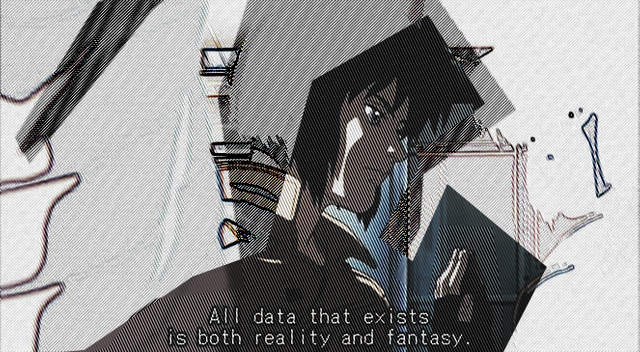
Let's imagine that every state of imagination possible is actually already in existence, hidden in the ethers of eternity. All we need is to stumble upon these thoughts, and manifest them as intellectual property. What if machines already beat us to it? What if there's a data storage somewhere in this universe that contains every single bit of IP that will ever come into existence? Maybe it'll happen in some supercomputer here on Earth in 2054? Maybe it has already happened in some secret Google lab?
Wouldn't that render IP obsolete?
It would seem like everything has been predetermined. Here's an interesting post that I cooked up a few months ago: Whatever I'm Writing Here Has Been Predetermined. Is this the originator for shorter sets of intellectual property? You be the judge.
The End of Intellectual Property?
I don't care much for IP, to be honest. But we operate in social settings, and have to deal with regulations. One good thing about IP law is that it protects underprivileged individuals from exploitation. By having better resources to file and claim IP, exploiters are able to beat someone else to it. Also, consider legal loopholes that may be used to have an advantage over someone else.

However, this is still not universally practical, because again, underprivileged folks simply do not have enough to fight a case, and win it. It can only work 100% of the time if the law is truly blind and just. That's for an ideal world. IP, like most laws, only better work better in favour of the privileged.
Count in the fact there's such a thing called coincidence. Some of us may produce stuff that resembles a protected IP, although most likely in differing fidelity / familiarity.
Thinking about Steemit - yes, we are definitely in the position for IP. The general etiquette is to credit (or avoid) claims as one's own product of labor. The solution is does not necessarily hinge on believing in intellectual property as rule of law, but it's in our best nature to avoid exploitation or theft, especially in light of knowing.
The end may be at some point down the road, but for now, we have the option to live in both worlds. Just like fiat and crypto.
Be the change that you want to see in the world.
Open-source projects and communities are a reflection of the times. There's a growing awareness, a counter-culture emerging to co-exist with intellectual property. Thinking about open-source blockchains - no one can stop you from running an exact duplicate, although the state of the network will differ. Perhaps that's it! Information doesn't occupy the same space. Duplicates are in fact, separate entities in their own right.
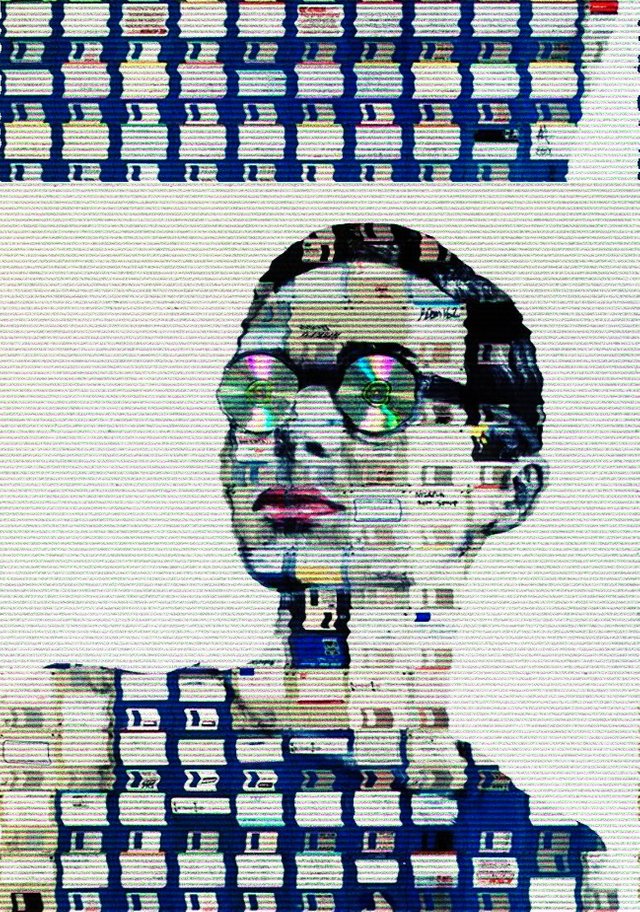
The only great concerns about the dissolution of IP are its legit use to protect people's livelihood from exploiters, and to secure sensitive data from falling into the hands of those that perpetrate violence. However, I think IP will be a thing of the past. It's something that comes with the end of criminalization, nations, and money in its traditional sense. I will explore deeper into these topic soon.
The best way moving forward is to operate in our own light, through the study of these concepts. I believe systems can be designed to further dissolve traditional concepts, just like what blockchains, and so many other up-and-coming technologies and user interfaces are doing for us.
One of my first posts on Steemit was an attempt to resolve IP ethically in a mashup / remix culture, which is the expressed version of the world we deal with everyday. @piedpier gave a great response:-
It's simple when you discard the whole concept of so-called intellectual property.
If I own my body and tools, then I can use them however I please. You can own storage devices and other such physical objects but you can't own information. As a musician and screenwriter, I understand that I charge for the service of production, performance, and distribution. I 'm not selling property, I'm providing services. As such, I don't concern myself with IP protection whatsoever.
I think it's amazing that we are able to connect the dots and produce masterpieces of our own - to learn, to educate, and to entertain. Intellectual property may advance vested interests, but realize that nobody should be able to own your thoughts, and you don't own yours either. It is when we start to share and participate in open-source projects, perhaps IP would one day become obsolete.
Until then, just keep on creating. Thanks for reading!
I think the IP protections only work if you have deep (corporate) pockets and can take people to court.
For the average user they do nothing and really stifle creativity.
There is also a lot of theft of work that should be in the commons that gets hijacked by large corporations. Take the examples of Happy Birthday which should always have been public domain and also stories like Aladdin, Snow White etc that Disney has taken control over.
Even though Disney does not have any right to the original stories simply the threat of their legal might can close down and prevent related projects.
Like many things IP law is designed to favour the large corporations and the lawyers.
The little guy just gets squashed from both directions.
Totally agree. Corporations are creations of the government and pretty much any "protection" they claim to provide for the individual (say, in this case, an author) is actually a protection for a corporate entity. IP is just another form of government-provided and government-enforced monopoly.
Yes, agreed, the little guy loses. All this will be a problem as long as money is still a thing ;) .. never know when someone decides to throw the hammer at you!
Yes and as long as some people and organisations have huge amounts of it and use the legal system to squeeze it out of regular people.
Some actual cases of IP
I knew a graphic designer once. He had made a series of cards. Later, Haulmark made a series of cards almost identical. Although my friend had very good evidence of IP infringement, his lawyer advised doing anything about it, because Hallmart would immediately pull the cards, and then counter-sue for lost revenue.
In cases of patents,... I will quote Tianjin, "There is no greater waste of time and energy for an inventor".
So, a guy patents and makes a great thing. The person next door copies the great thing and begins to sell it. The guy went to the police (the 2nd guys cousin) and tries to get him to stop the theft! Well, after 3 years and much court cost. The 2nd guy, closes shop, files bankruptcy, moves 1 door down and starts again.
Haha thanks for the lil story there @builderofcastles - it is a problem - in this case, competition. To only way to get out of it is to actually have a decent monopoly, i.e, bigger firm.
I don't have an issue with IP - the problem is that current IP laws are draconian and as you so point out very well, easily exploitable by the powerful.
I'd like to see a modern IP code. Leaving aside how it should be enforced - on Steemit I believe it's working well with a voluntary legal system of sorts (Steemcleaners etc.) but I don't know if this would work in the real world.
Today's fair use laws are actually a pretty good starting place, they just need to be clarified, elaborated and codified for the internet world. Following that, it becomes pretty easy to see what can be copied under fair use, while what is considered theft. There'll always be a thin line, but aside from corner cases, this should be an issue. For example, when someone has spent $10 million, 100 people and 1 year to make a movie and you put it up online, that's obvious theft - easy to see. However, if a creative person adds footage from the same film to make a review, or a remix, or something, fair usage rules can exempt IP protection. I'd even say if someone else makes a film with the same story but a subtly different approach, that should qualify for fair use too, but that's a debate worth having.
Eventually, we can have AI decide precisely how original and worthy of IP protection some material is, when content proliferates nearer the singularity.
And yes, I absolutely think AI generated content should qualify for IP protection.
I've already faced some of the IP protection stuff in Youtube and Soundcloud before. But mostly inaccurate, or just because there were some parts in the music / mix that had some signals of IP material, but I guess those bots running around those website are just pattern seekers.. although I wonder how complicated it can get lol. Yeap, I think the best way to secure IP is to be able to get your truth to as many different parties as possible!
What happened, in your case?
A few thoughts in a small space:
Coercive IP is only needed at approximately human-level intelligence, but it is viewed as essential to protect the works of some artists. (Many artists would be impoverished without it, and IP does act as a disincentive.) So why divide the libertarian movement? Let's resolve this by voluntarily moving towards reduced IP, as we can, without fighting with those who don't wish to.
Ideally, the artists/creators themselves decide whether they wish to retain IP titles to their works, or whether their works have diminished IP, or none at all.
Until then, let's fight to end the DEA, IRS, ATF, EPA, and other coercive monsters, such as the local police: https://fee.org/resources/there-are-no-good-cops/
great post. the first person that i ever ran across, talking about how copyright and patent stifles innovation was Robert Heinlein. he was right. we, as humanity, will release ourselves from the silly notion of IP, or we will murder the singularity, and our future, in it's crib.
What? Where? Or did he express it in one of his books? I've read some but couldn't recall! Or did you literally ran across him? :D
in one of his books. i've been racking my brain, but have yet to remember. sorry. i'm following, if i remember, i'll let you know.
I've only read Stranger in Stangeland and The Moon is a Harsh Mistress, don't think I recall specifically any commentaries on copyright / patent. But I think most science-fiction authors will recognize this.. afterall scifi usually make extremes out of situations, and a way to study, in words, how we are as individuals and a society.
i do know that Spider Robinson made it into a fictional scenario as an interview with Virginia Heinlein.
Kevin, these original images... are fantastic. What tools did you use to create them?
I've argued from the position of game theory for beneficial actions toward each other when talking about IP and such. Good stuff.
Here, here! I truly hope this is the case and we will see it happen within our lifetime with a the result of increasing well being for all.
Great post, Kevin!
I like to use this tool here to make original images.. lol! https://getmosh.io/
I need to look into game theory, it's something I've read before but I don't find myself using it when paths for decision-making.
Thanks! I think this The End of.. series is pretty interesting to explore, kinda forcing myself to write through all these to understand things better :)
As a writer I am certainly concerned with the state of intellectual property law. On the one hand, I want to ensure that there's a long enough chain of custody on any creative works that I produce that leads back to me as the originator, as I don't want someone else passing off my hard work as their own.
On the other hand, I'm not the kind of creative that wants to work in a vacuum. Collaboration can yield some amazing results, and - for instance - opening up a fictional world or setting and welcoming other writers in to create in that world usually results in a deeper vibrancy, making it more than the sum of its parts. A good example of this is the Cthulhu Mythos. Sure it was originated by H.P. Lovecraft, but even during his lifetime he welcomed his writer friends to pen stories using the tropes and settings of his world - as a result the Mythos not only survived Lovecraft's death but flourished.
That's why I get so disappointed when large, corporate IP holders quash labor-of-love fan projects like films or games set in an established universe. All those cease-and-desist letters do nothing but shackle and even outright forbid the kind of creativity that can enrich not just a particular IP but entertain its fans in ways that they may not be able to be otherwise. Most IP holders will claim that it's in order to protect the "integrity" or "quality" of their brand, but it's almost always an economic decision - they don't want someone else making profit off the IP unless it's them, regardless of how attenuated the connection might be. It's frustrating in the extreme.
The actual reason for quash fan projects is thus:
If you allow one fan to do something, it is legal precedence for another fan to do the same something.
And thus, you cannot allow the first domino. Else, you lose your entire IP.
That is the copyright / patent law.
I think that's a bit of an oversimplification. You don't "lose" your entire IP. What you do lose is some ability to bar fan projects more effectively because you've established precedent by not pursuing your legally-granted right to have exclusive access to your IP.
Yes, if anything, IP owners should consider different business models that allow for such collabs / spin-offs to happen. I guess "integrity" / "quality" is somewhat an economic decision as well as it ties together with the value of the IP (usually completely unfounded projections of future loses). Like what Peter Thiel mentioned in his book Zero to One, having a monopoly works in one's favour of knocking out competitions, but the best kind of monopoly is creative monopoly, where there's a mix of competition & collaboration, usually in the form of a marketplace that gives the consumers more options to choose and be time-invested in.
Fascinating discussion and exploration of IP protection. Thank you.
Thanks @donkeypong , glad it was interesting :)
What a great post! And an interesting topic to boot! I know in China they have very little regard for IP, maybe they are actually ahead of us instead of behind us! :)
Thanks! Yes.. maybe? Not sure what's more backward lol, but I guess duality is at play, and may be important to co-exist.
Nice meeting you. Upvoted and following. Wow, I am impress with your ability to attract 1k followers.
@hanamana - thanks! I think I just got lucky getting on the platform earlier.. still trying my best!
Your English writing skills are 10x better than mine. Good for u.